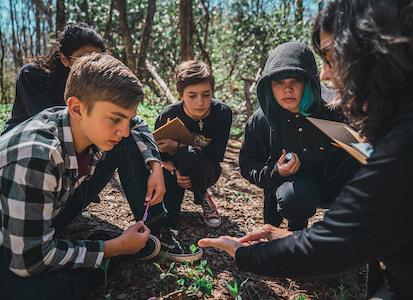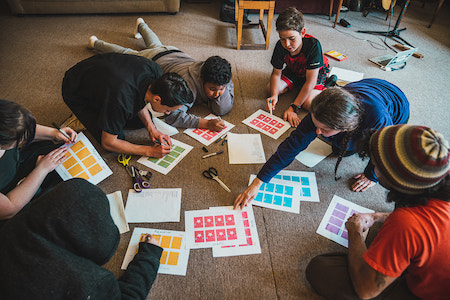What is a Junior Boarding School?

Boarding school can mean a lot of different things to different people. Some think of tall, gothic buildings full of students in uniforms. Others think of robe clad teenagers brandishing wands and battling the forces of evil. The idea of boarding school is so widespread, and perhaps alluring, that many books, television shows and movies have been made about it. They fill us with imagery that fuels our imaginations about what it would be like to spend our formative years living independently, constantly alongside our friends. However, when people hear “junior boarding school”, they are not quite sure what to think. Junior boarding schools are a bit of a mystery, especially in the United States where most students only leave home once they start college. So, just what is a junior boarding school?
Junior Boarding School Defined
Junior boarding schools are residential schools for students in ninth grade or lower. They usually start around sixth or seventh grade. Many people assume these schools are either for at-risk teenagers or gifted students. However, many junior boarding schools just serve the typical curious and awkward young adolescent. While some boarding schools will include these grades along with high school programs, a junior boarding exclusively works with these younger students.
A person’s early teenager years are a unique time. Their interests include those of young elementary students. However they are also curious about more mature activities. They yearn to be more independent while still needing plenty of nurturing support. Many young adolescents experience a natural period of lower executive functioning due to their changing bodies and synaptic pruning. It can feel very challenging. Junior boarding schools offer a setting where this unique age group can get both the freedom and support they require to thrive.
 Why Choose Junior Boarding School?
Why Choose Junior Boarding School?
If young adolescents require so much specialized attention, one might ask why should they go away to boarding school? After all, parents should know their kids best. Aren’t they the one most equipped to give their young teenager what they need? The truth is that many parents can actually stifle their young teen’s growth. They believe they know their child so well, they can end up putting them in box. Young adolescents often want to reinvent themselves. Starting fresh can be difficult when they have a parent right behind them who knows all their past mistakes.
In the Erdkinder appendices of From Childhood to Adolescence, Maria Montessori writes about young adolescents. She offers that is positive for them to live away from their parents. By doing so, they start to learn how they fit into the larger world. Young teen’s relationships with their parents often become patterned. The teenager isn’t able to recognize their full potential as contributing members to their community. However if they live with strangers in a new community, the young teens experience feeling needed. They learn how they can contribute in valuable ways to the world around them.
Junior boarding school allows young adolescents to break free from their parents’ expectations. They figure out that they don’t need to rely so heavily on their parents. In turn, they build confidence as they gain self reliance. They learn to advocate and communicate for themselves. They recognize they are capable of being responsible and rise to the challenge. Junior boarding school students are still being supervised and mentored. Teachers, houseparents, and advisors are there to teach and guide them. However, because they are able to start fresh, they feel less weighed down by all they times they needed their parents’ help.
Creating the Ideal Junior Boarding School
 Since junior boarding schools only work with young adolescents, they are able to create environments that specially cater to this age group. Many junior boarding schools offer larger art spaces so middle schoolers can explore their creativity. Another typical feature is lots of outdoor space that allows the students to interact with the natural world. Young adolescents love to feel like they can contribute, so many junior boarding schools offer farm programs or cottage industries. All of these components enrich a young adolescent’s life by introducing them to new types of work and skills they can master.
Since junior boarding schools only work with young adolescents, they are able to create environments that specially cater to this age group. Many junior boarding schools offer larger art spaces so middle schoolers can explore their creativity. Another typical feature is lots of outdoor space that allows the students to interact with the natural world. Young adolescents love to feel like they can contribute, so many junior boarding schools offer farm programs or cottage industries. All of these components enrich a young adolescent’s life by introducing them to new types of work and skills they can master.
Academically, junior boarding schools also have an advantage in working with such a specialized age group. Middle schoolers want their work to matter. They often question the purpose of what they are learning and how it will help them once they grow up. Junior boarding schools are able to cater their curriculums to these budding, curious minds. They may offer classes that interact with the real world or go on lots of field trips. Doing so, demonstrates the actual applications of their studies. The classes tend to be more interactive and allow students to practice new skills with people in the larger community. In this way, junior boarding schools set students up better for their future. They help them recognize their interests and how they put their passions to work.
Learn more about what is a junior boarding school by talking to our admissions coordinator!
While boarding schools have captured the minds of many people thanks to the plethora of movies and books about them, junior boarding school have yet to leave such lasting impressions. However as parents learn about how attending a junior boarding school can benefit their young adolescents, they hopefully become more popular. Choosing to send your young adolescent to a junior boarding school may be just what they need to realize their potential.
-by Nicholas Maldonado
